CPTPP to come into force in late 2018
The Comprehensive and Progressive Agreement for Trans-Pacific Partnership (CPTPP) is hoped to take effect in December 2018 after Australian Prime Minister Scott Morrison announced on October 30 that his country had ratified the agreement.
 Ministers pose for an official picture after signing the rebranded 11-nation Pacific trade pact Comprehensive and Progressive Agreement for Trans-Pacific Partnership (CPTPP) in Santiago, Chile, on March 8, 2018 (Source: AFP/VNA)
Ministers pose for an official picture after signing the rebranded 11-nation Pacific trade pact Comprehensive and Progressive Agreement for Trans-Pacific Partnership (CPTPP) in Santiago, Chile, on March 8, 2018 (Source: AFP/VNA) Hanoi (VNA) - The Comprehensive and Progressive Agreement for Trans-Pacific Partnership (CPTPP) is hoped to take effect in December 2018 after Australian Prime Minister Scott Morrison announced on October 30 that his country had ratified the agreement.
According to foreign media, Morrison said Australia is the six country coming on board, adding that the CPTPP is one of the most comprehensive and ambitious trade agreements in Australia's recent history.
Meanwhile, Minister for Trade and Export Growth of New Zealand David Parker said Australia's ratification triggers the 60-day countdown to entry into force of the agreement and the first round of tariff cuts.
Previously, Mexico, Japan, Singapore and New Zealand and Canada had ratified the CPTPP.
The Comprehensive and Progressive Agreement for Trans-Pacific Partnership – the revised trade deal born out of the Trans-Pacific Partnership Agreement (TPP) following the withdrawal of the United States last year – will be provisionally enacted 60 days after it is ratified by six countries.
David Parker said “the importance of CPTPP has grown over recent months with the rapid escalation of protectionist measures around the world”.
He noted that New Zealand's adoption of the deal means that in the future, its businesses will be able to benefit from improved trade conditions and reduced tariffs.
According to a recent report by the Economic and Social Commission for Asia and the Pacific (UNESCAP), increased trade protectionism will slow down economic growth, especially in developing countries.
The World Bank has estimated that if trade barriers are completely removed, developing countries can increase their budget revenues and bring millions of people out of poverty.
The CPTPP is one of the most comprehensive trade deals ever concluded and strips 98 percent of tariffs for 11 countries with a combined GDP of more than 13.5 trillion USD and close to 500 million consumers.
It was signed by 11 member states, namely Australia, Brunei, Canada, Chile, Japan, Malaysia, Mexico, New Zealand, Peru, Singapore, and Vietnam in March 2018.–VNA












